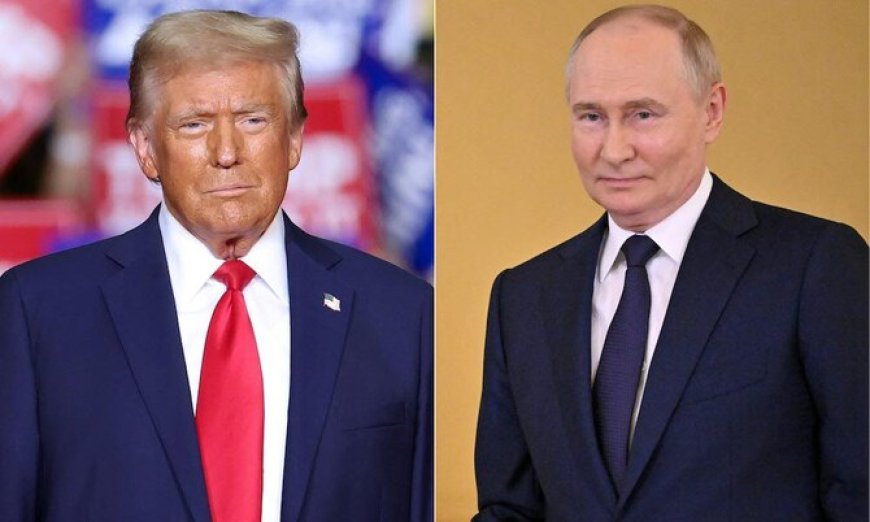Trump's Attempt to End the Ukraine War: A Critical Analysis of His Peace Efforts
In a recent development, former US President Donald Trump has asserted that he had a direct conversation with Russian President Vladimir Putin regarding the cessation of the ongoing conflict in Ukraine. This is the first public recognition of a direct conversation between the two leaders since early 2022, following Russia's invasion of Ukraine. Trump has not yet provided a detailed plan or strategy for achieving peace, despite his commitment to putting an end to the carnage. This article explores the implications of Trump's assertions, the context of his foreign policy stance, and the obstacles that await him.

In a recent development, former US President Donald Trump has asserted that he had a direct conversation with Russian President Vladimir Putin regarding the cessation of the ongoing conflict in Ukraine. This is the first public recognition of a direct conversation between the two leaders since early 2022, following Russia's invasion of Ukraine. Trump has not yet provided a detailed plan or strategy for achieving peace, despite his commitment to putting an end to the carnage. This article explores the implications of Trump's assertions, the context of his foreign policy stance, and the obstacles that await him.
Russia's annexation of Crimea in 2014 marked the beginning of the conflict in Ukraine, which was rapidly followed by pro-Russian separatist movements in Eastern Ukraine. Putin escalated the situation in 2022 by initiating a full-scale invasion, citing Ukraine's NATO ambitions as a significant threat to Russia's security. Trump has consistently expressed his desire to conclude the conflict, characterizing it as a "bloodbath" and underscoring the necessity of halting the violence, despite the geopolitical implications.
Trump has been vocal about his desire to engage Putin and conclude the conflict since his departure from office. In a recent interview, he declared, "He [Putin] desires to see an end to the death of people." The White House did not corroborate or deny Trump's assertions, but Kremlin spokesman Dmitry Peskov remained non-committal, acknowledging that various communications were being conducted but leaving details vague.
Trump's proposed peace initiatives are met with both curiosity and skepticism. His relationship with Putin has been the subject of much scrutiny for an extended period, with some critics arguing that his reverence for the Russian leader undermines his credibility. To the contrary, Trump has consistently emphasized that his diplomacy is predicated on his self-described "Art of the Deal" tactics and personal relationships. Trump has stated that he has a "concrete plan" to conclude the war, but he has not yet disclosed any specifics regarding this plan.
Additionally, Russia has established explicit prerequisites for any peace negotiations. Putin stated in June 2024 that Ukraine must renounce its NATO ambitions and withdraw from the territories of four Ukrainian regions that Russia claims. These demands underscore the challenge of achieving a peaceful resolution, as Ukraine is adamant about maintaining its territorial integrity and sovereignty.
Trump has suggested that he may organize a summit with Putin, but the specifics are still sketchy. Saudi Arabia or the United Arab Emirates, countries that are perceived as neutral in the conflict, are potential venues for such discussions, according to reports. Nevertheless, Putin has maintained his stance on the matter of territorial concessions and has disallowed any significant modifications to Russia's territorial claims.
In an intriguing development, Leonid Slutsky, the head of the international affairs committee of the Russian parliament, announced that preparations for a prospective Trump-Putin meeting were "advanced." He predicted that the meeting could take place in February or March 2025. This indicates that discussions regarding a peace process are currently underway, despite the fact that they are occurring in the face of intricate and difficult circumstances.
As of early 2025, the conflict in Ukraine has resulted in a substantial loss of life, with preliminary estimates of more than 150,000 casualties on both sides. Global supply channels have been significantly disrupted, particularly in the energy and agricultural sectors, resulting in a severe economic toll. The consequences have been observed on a global scale, as the existing global tensions have been exacerbated by the escalating energy prices and food shortages.
Critics of Trump contend that his efforts to negotiate with Putin could be detrimental to the West's position. They suggest that any negotiations that involve territorial concessions could further embolden Russia and destabilize the region. In contrast, Trump's supporters are of the opinion that his direct approach has the potential to produce results, as his unconventional diplomatic approach has the potential to break through the impasse that has characterized the conflict.
The question of whether Donald Trump can uphold his promise of ending the conflict remains uncertain as the war in Ukraine enters its third year. Although his willingness to engage Putin is evident, the practical obstacles of negotiating a peaceful resolution between two deeply entrenched parties are overwhelming. It remains to be determined whether Trump's endeavors will result in an enduring resolution or if they will be merely political theater.
The time for any meaningful intervention is dwindling as the situation in Ukraine continues to worsen. At present, Trump's pursuit of peace is a highly intricate and speculative endeavor, with the world intently monitoring his ability to translate his words into action.













































